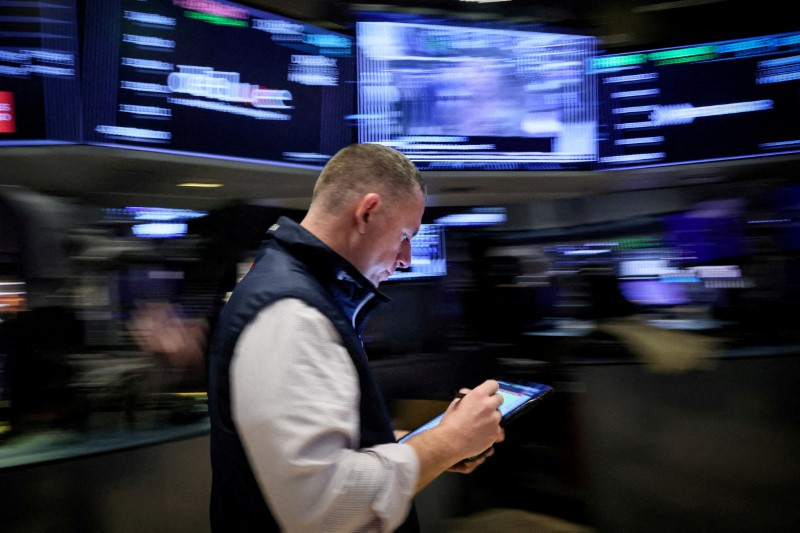By Yoruk Bahceli, Matt Tracy and Emma-Victoria Farr
(Reuters) - A tumultuous sell-off in financial markets this month has barely scathed global financing conditions, but the risk of further volatility means borrowers are not yet out of the woods.
Equity and corporate debt markets have clawed back some of their losses sparked earlier in August by U.S. recession fears and the unwinding of a popular yen carry trade.
They remain markedly weaker than a month ago, however, with the S&P 500 broad U.S. stock index still 5% below July's peak after an initial plunge of nearly 10%. European stocks have taken a similar hit.
Higher and lower-rated corporate bonds have meanwhile given up much of a decline this year in the risk premium they pay over government bonds.
But financing conditions - the ease with which borrowers can obtain funding - have not tightened enough, even at the height of the selloff, to spark worries about a sharper economic slowdown that could hasten central bank interest rate cuts.
"We just haven't seen big enough moves to materially change financing conditions for corporates or households," said Chris Jeffrey, head of macro strategy at Legal & General Investment Management.
Indeed, a closely-watched gauge of U.S. financial conditions compiled by Goldman Sachs shows that while they have tightened sharply since mid-July, conditions remain loose historically and more accommodative than in much of last year.
Global stocks, for example, are still up nearly 10% this year and credit spreads are lower than in 2023.
Goldman estimates that every potential further 10% sell-off in equities would reduce U.S. economic growth over the next year by just under half a percentage point, while associated moves in other markets if equities slumped could imply a total hit of just under a percentage point.
So with U.S. growth still over 2%, it would take a much bigger drop in equity markets to cause significant economic pain that ripples out globally.
RATE CUTS
With the U.S. Federal Reserve set to start cutting rates soon and other central banks already doing so, the key takeaway from the recent market ructions is a fall in borrowing costs.
U.S. 10-year Treasury yields are down more than 50 basis points since the start of July, while yields on UK and German government bonds have fallen over 30 bps apiece as investors bet on steeper rate cuts.
That bodes well for borrowers. U.S. investment-grade corporate bond yields have also dropped 50 bps since the start of July.
Highly-rated companies raised $45 billion from U.S. bond sales last week, according to LSEG's IFR - at the high end of analyst expectations and a sign of confidence amid the selloff.
There were also more bond sales in Europe than a year ago, while the U.S. market made a strong start to this week.
"It doesn't seem like access to credit is really a problem right now," said Idanna Appio, portfolio manager at First Eagle Investments.
"Indeed, lower Treasury yields are opening up a window for companies to come to market," Appio, a former Fed economist, said.
Even junk bond yields are down 37 bps since the start of July, meaning conditions have become more favourable for lower-rated companies, which raised $7.2 billion from bond sales in the U.S. last week.
WEAK POCKETS?
Expectations that volatility will remain elevated nevertheless create uncertainty for borrowers.
The VIX index, Wall St's "fear gauge", dropped below 20 points this week to its lowest this month, but remains much higher than its January-July average.
And with August usually quiet for initial public offerings, the impact on equity fundraising - which typically takes a hit when volatility rises - has yet to be seen.
Dealmakers said they were sanguine as long as markets remain calm, but mindful of uncertainty ahead.
Javier Rodriguez, global head of value creation at KPMG, did not rule out IPO deals in the pipeline slowing or stopping.
"There is no certainty on (what) the final picture might look like, but potentially a cooled-down market when compared to the last 18 months," he said.
In credit markets, while money flowed into investment-grade bonds last week, junk bonds saw outflows, according to BofA, signalling caution around weaker borrowers.
With high-yield bond sales globally having notched their highest first half of the year since 2021, according to LSEG, outflows are unlikely to alarm borrowers yet.
But some were sizeable. Outflows from U.S. leveraged loans, whose investors take a hit when interest rates fall, were the largest since the height of the COVID pandemic in March 2020, according to JPMorgan. The impact of the carry trade unwind itself on liquidity conditions also remains a risk to watch.

"Once carry trades plunge, funds flee countries and assets where they finance economic activity," said BCA Research's chief European strategist Mathieu Savary. "As a result, liquidity conditions tighten where growth is generated, which harms global economic activity."
(This story has been refiled to change the fund manager's name to First Eagle Investments, in paragraph 16)